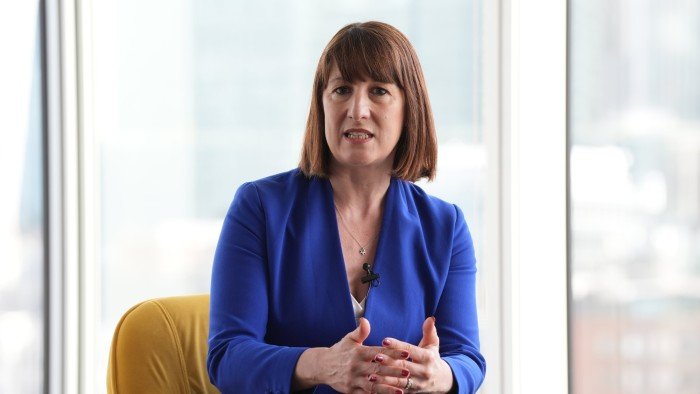Unlock the Editor’s Digest for free
Roula Khalaf, Editor of the FT, selects her favourite stories in this weekly newsletter.
The UK’s public finances swung to a smaller than expected surplus in January, compounding the problems chancellor Rachel Reeves faces as she struggles to keep her Budget plans on track and kick-start the economy.
The public sector was in surplus by £15.4bn in January, the Office for National Statistics said on Friday, £0.8bn more than last year but falling short of the £20bn January surplus the Office for Budget Responsibility expected when it last published forecasts alongside the October Budget.
The shortfall reflected lower tax receipts than expected in the month when self-assessed income and capital gains taxes fall due. It brought borrowing in the first 10 months of the financial year to £118.2bn — £11.6bn more than in January last year and £12.8bn higher than the OBR had expected.
“The pressure on the public finances is seemingly relentless,” said Elliott Jordan-Doak, economist at consultancy Pantheon Macroeconomics, adding that Reeves would now have “a bigger job of work to do . . . to rectify the fiscal situation” at next month’s Spring Statement.
The figures come as the chancellor struggles to lift growth in the UK economy while sticking to her self-imposed fiscal rules, which stipulate that current spending excluding investment be funded by tax receipts.
Her plans have been blown off course by poor economic data, including flatlining growth, resurgent inflation and dismal productivity, which threaten to wipe out the £9.9bn margin of error she gave herself in October.
Philip Shaw, economist at Investec, said Friday’s figures “increase the risk that the OBR concludes that the fiscal rules will be missed on current policy settings”, forcing Reeves to raise taxes or cut spending “at some stage to pull the public finances back on track”.
The OBR said the overshoot in borrowing over the financial year so far was mainly because receipts from self-assessed taxes and corporation tax were lower than expected, as well as the product of higher borrowing by local government.
The picture could still improve, once tax returns filed late in February are counted. But analysts said weak receipts were likely to reflect the poor underlying state of the economy.
Two separate data releases on Friday underlined the fragile state of consumer and business confidence.
Figures published by the ONS showed a stronger recovery in retail sales than had been expected in January, with sales volumes rising by 1.7 per cent month on month, following a 0.6 per cent fall in December.
But the rebound was purely the result of food sales. Analysts said this was likely to reflect the difficulty of adjusting the data for Christmas seasonality, but could also mean people were eating out less, with retailers gaining only at the expense of the hospitality sector.
Retail sales over the three months to January were still 0.6 per cent lower than the previous quarter.
Meanwhile, a closely watched survey pointed to stalling activity and very weak hiring in the private sector, with businesses reporting a lack of new work, sharp falls in export orders and intense cost pressures.
S&P Global, which produces the survey, said its composite PMI index of business activity slipped slightly from 50.6 in January to 50.5 in February, with a pick-up in services activity offsetting a downturn in manufacturing.
But the share of businesses expecting to cut jobs was the highest since the 2008-09 financial crisis, excluding the pandemic period, with the survey’s employment balance falling from 45.3 in January to 43.5 in February.
Alex Kerr, UK economist at consultancy Capital Economics, said the “run of bad news” in recent economic data underlined the difficult choices for Reeves, in particular as pressure mounted to increase defence spending at the urging of US President Donald Trump.
Even before this “ratcheting up of pressure” on defence, her options ahead of the Spring Statement were “bleak”, Kerr said. Now, a combination of higher gilt yields, weak productivity and poor growth meant headroom against the fiscal rules could be “wiped out completely”.
The UK fiscal outlook could yet improve between now and when the OBR produces its final report alongside the March 26 statement, meaning tax increases or harsh spending cuts prove unnecessary.
Isabel Stockton, senior research economist at the Institute for Fiscal Studies think-tank, said short-term changes mattered less than “how much bounce back the OBR expect for the medium term”.
But Stockton added that if the fiscal forecast did prove worse than in October, Reeves would “face a truly unenviable set of choices, none of which are made easier by the upwards pressures on defence spending”.
The OBR’s initial forecast handed to the Treasury earlier this month showed Reeves’ headroom had evaporated.
Darren Jones, chief secretary to the Treasury, said the government was “committed to delivering economic stability and meeting our non-negotiable fiscal rules”.
But shadow chancellor Mel Stride said: “The latest borrowing figures expose the true cost of Labour’s reckless economic policies.”
This article has been amended since initial publication to reflect the fact that the January surplus in the public finances fell short of expectations
